Header image from National Park Service, Ice Age National Scenic Trail, Cross Plains, Wisconsin.
Wisconsin was admitted on May 29, 1848 as the 30th state.
Bird: Robin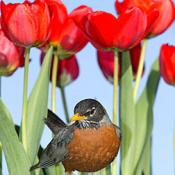 – The robin is considered a symbol of spring, often the first migratory bird to return north. There is a Quebec superstition that whoever sees the first robin of spring will have good luck. American robins have exceptionally keen eyesight that allows them to see the tiny disturbances in the soil that indicate where worms are moving. This is how robins find worms, though they also use their senses of hearing and touch as part of their hunting as well. State bird of Connecticut, Michigan, Wisconsin
– The robin is considered a symbol of spring, often the first migratory bird to return north. There is a Quebec superstition that whoever sees the first robin of spring will have good luck. American robins have exceptionally keen eyesight that allows them to see the tiny disturbances in the soil that indicate where worms are moving. This is how robins find worms, though they also use their senses of hearing and touch as part of their hunting as well. State bird of Connecticut, Michigan, Wisconsin
Flower: Wood violet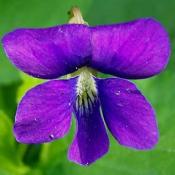 Violets typically have heart-shaped leaves. Their surface is either smooth or covered with fine hairs, depending on the species. Violet flowers symbolize delicate love, affection, modesty, faith, nobility, intuition and dignity. The meaning of the violet changes depending on the color of the flower and the person the flower is sent to. Blue violet flowers symbolizes love and faithfulness, white violets represent purity and chastity, and yellow violets symbolize high worth and goodness. One quirk of some Violets is the elusive scent of their flowers; along with terpenes, a major component of the scent is a ketone compound called ionone, which temporarily desensitises the receptors of the nose, thus preventing any further scent being detected from the flower until the nerves recover
Violets typically have heart-shaped leaves. Their surface is either smooth or covered with fine hairs, depending on the species. Violet flowers symbolize delicate love, affection, modesty, faith, nobility, intuition and dignity. The meaning of the violet changes depending on the color of the flower and the person the flower is sent to. Blue violet flowers symbolizes love and faithfulness, white violets represent purity and chastity, and yellow violets symbolize high worth and goodness. One quirk of some Violets is the elusive scent of their flowers; along with terpenes, a major component of the scent is a ketone compound called ionone, which temporarily desensitises the receptors of the nose, thus preventing any further scent being detected from the flower until the nerves recover
Tree: Sugar Maple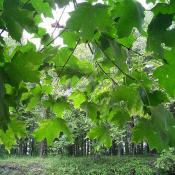 Sugar maple is best known for its bright fall foliage and for being the primary source of maple syrup. It takes 40 parts of maple sap to produce only 1 part of pure syrup. The wood from the sugar maple tree is used for making bowling alleys and bowling pins; basketball courts, including the floors used by the NBA; and baseball bats. It is also widely used in the manufacture of musical instruments, such as the members of the violin family (sides and back), guitars (neck), and drum shells.
Sugar maple is best known for its bright fall foliage and for being the primary source of maple syrup. It takes 40 parts of maple sap to produce only 1 part of pure syrup. The wood from the sugar maple tree is used for making bowling alleys and bowling pins; basketball courts, including the floors used by the NBA; and baseball bats. It is also widely used in the manufacture of musical instruments, such as the members of the violin family (sides and back), guitars (neck), and drum shells.
Wisconsin State Quarter
From theus50.com
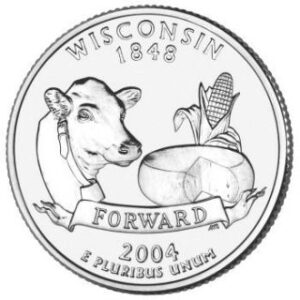
The Wisconsin design depicts an agricultural theme featuring a cow, a round of cheese and an ear of corn. The design also bears an inscription of the State motto, “Forward”.
Wisconsin adopted the State motto, “Forward,” in 1851, reflecting Wisconsin’s continuous drive to be a national leader. Wisconsin is considered “America’s Dairy Land” with production of over 15 percent of the Nation’s milk. Wisconsin also produces over 350 different varieties, types and styles of award-winning cheeses, more than any other state. There are approximately 17,000 dairy farms, with just over one million cows that produce an average of 17,306 gallons of milk each, per year.
Wisconsin is also a major corn-growing state. In 2002, Wisconsin led the Nation in corn silage production and, with 391.5 million bushels produced, it ranked fifth in the production of corn for grain (shelled corn). State corn production contributed $882.4 million to the Wisconsin economy in 2003. Wisconsin is also a leading supplier of mint.
Capital: Madison
Nickname: Badger State – Wisconsin earned the nickname “Badger State,” not because of its proliferation of badgers, but because its earliest white inhabitants were itinerant lead miners who burrowed into the hills for shelter rather than waste time and resources on a more permanent structure.
Motto: Forward
Wisconsin Facts and Trivia
Wisconsin visitors and residents enjoy the state’s 7,446 streams and rivers. End-to-end they’d stretch 26,767 miles. That is more than enough to circle the globe at the equator.
Wisconsin’s Door County has five state parks and 250 miles of shoreline along Lake Michigan. These figures represent more than any other county in the country.
The first European to arrive in the region was French explorer Jean Nicolet in 1634. Nicolet was searching for a Northwest Passage to China, which he didn’t find. However, he did find a land rich in beaver furs. Soon Europeans were coming to Wisconsin from Canada to trade with the local natives for furs they could sell in Europe.
Over the next several years, more French arrived in the region including fur traders and missionaries. One of the French traders, Nicolas Perrot, established a trading post at Green Bay in 1667. After building a number of trading posts in the region, he claimed the land for France in 1689.
Although the French claimed the land, many English fur traders began to move into the region. In 1754, the French and Indian War began between France and Britain. Some of the local Native Americans fought on the side of the French and some on the side of the British. The British eventually won the war and, in 1763, they gained control of much of the French land including Wisconsin.
After the end of the American Revolutionary War in 1783, Wisconsin became part of the United States. In 1787, it became part of the Northwest Territory. This was a large area of land in the northern Midwest. It included such future states as Wisconsin, Ohio, Indiana, Illinois, and Michigan. Despite being considered part of the U.S., the British still largely controlled the region until the Americans defeated them in the War of 1812.
In the 1820s, lead ore was discovered in Wisconsin. This brought in a lot of new settlers who began to take over the land of the Native Americans. Eventually, the Native Americans were forced by the United States government to move out of Wisconsin. In 1832, the Fox and Sauk tribes decided to return to their homeland. They were led by Chief Black Hawk. They fought a number of battles against the U.S. Army in what became known as the Black Hawk War. They were finally defeated at the Battle of Bad Axe. An interesting fact is that Abraham Lincoln was a member of the U.S. Army during the Black Hawk War.
In 1836, the Wisconsin Territory was created by the U.S. Congress. The first capital was the town of Belmont, but it was soon moved in 1838 to the current capital of Madison. Wisconsin continued to grow, becoming mostly a land of farmers. It joined the Union as the 30th state on May 29, 1848.
Wisconsin remained a member of the Union during the Civil War. Although no major battles were fought in the state, it sent over 90,000 soldiers to fight for the North.
In 1854, the Republican Party was founded as the anti-slavery party in the city of Ripon.
The nation’s first kindergarten was established in Watertown in 1856. Its first students were local German-speaking youngsters.
The first practical typewriter was designed in Milwaukee in 1867.
In 1882 the first hydroelectric plant in the United States was built at Fox River.
The House on the Rock was designed and built in the early 1940s. It is considered an architectural marvel and is perched on a 60-foot chimney of rock. The 14-room house is now a complex of rooms, streets, buildings, and gardens covering over 200 acres. The Infinity Room contains 3,264 windows.
1919 – The Green Bay Packers football team was established by Earl “Curly” Lambeau.
Wisconsin has a penchant for naming various places as the “Capital of the World” or “Capital of Wisconsin” or somesuch:
- Bloomer is the Jump Rope Capital of the World.
- Bonduel is the Spelling Capital of Wisconsin.
- Eagle River is known as the Snowmobile Capital of the World.
- Green Bay is the Toilet Paper Capital of the World.
- Mercer is the Loon Capital of the World.
- Monroe is the Swiss Cheese Capital of the World.
- Muscoda is the Morel Mushroom Capital of Wisconsin.
- Sheboygan is the Bratwurst Capital of the World.
- Somerset is the Inner Tubing Capital of the World.
- Sturgeon Bay is the Shipbuilding Capital of the Great Lakes.
- Wausau is the Ginseng Capital of the World.
- Wisconsin is the dairy capital of the United States.
Strange Laws:
State Law made it illegal to serve apple pie in public restaurants without cheese.
The state definition of rape stated that it was a man having sex with a woman he knows not to be his wife.
While all cheese making requires a license, Limburger cheese making requires a master cheese maker’s license.
It is illegal to kiss on a train.
It is illegal to cut a woman’s hair.
Margarine may not be substituted for butter in restaurants unless it is requested by the customer.
Butter substitutes are not allowed to be served in state prisons.
Whenever two trains meet at an intersection of said tracks, neither shall proceed until the other has.
As people used to smuggle it in from Illinois, all yellow butter substitute is banned.
One may not camp in a wagon on any public highway or risk a fine of up to ten dollars.
People:
- Don Ameche actor
- Ellen Corby actress
- William Defoe actor
- Tyne Daly actress
- Jeanne Dixon seer
- Chris Farley actor
- Woody Herman band leader
- Harry Houdini magician
- Pee Wee King singer
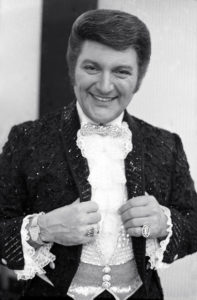 Władziu Valentino Liberace, pianist, showman
Władziu Valentino Liberace, pianist, showman- Allen Ludden, TV host
- Alfred Lunt actor
- Frederic March actor
- Jackie Mason comedian
- Charles and John Ringling circus entrepreneurs
- Pat O’Brien actor
- Georgia O’Keeffe painter
- Les Paul musician
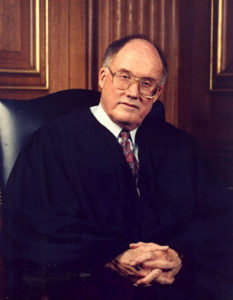 William H. Rehnquist jurist
William H. Rehnquist jurist- The original Barbie is from Willows. Barbie’s full name is Barbie Millicent Roberts.
- Tom Snyder newscaster
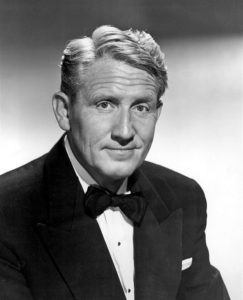 Spencer Tracy actor
Spencer Tracy actor- Bob Uecker baseball player
- Orson Welles actor and producer
- Laura Ingalls Wilder author
- Thornton Wilder author
- Frank Lloyd Wright architect
Credits:
See ducksters.com
See 50 states.com
See history.com
